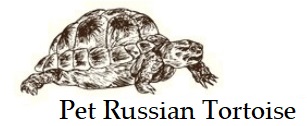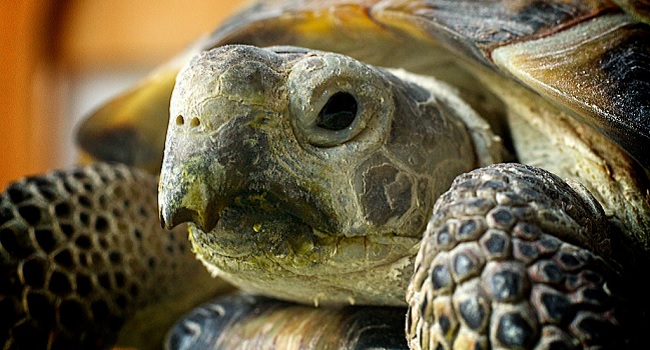
Russian tortoises (Testudo horsfieldii) are one of the most popular pet tortoises. Female Russian tortoises average 8-10″, whereas male Russian tortoises average between 6-8″.
Housing
Russian tortoises are one of the most popular pet tortoises because they are a smaller tortoise. They can be housed inside year-round.
Enclosure Size
House one to two adult Russian tortoises in a habitat no smaller than 4′ x 2′. You can buy large storage totes, like 50 gallon Christmas tree totes for simple indoor enclosures for a Russian tortoise. Try not to use a glass aquarium, but if this is your only option, you want to use at least a 75 gallon tank.
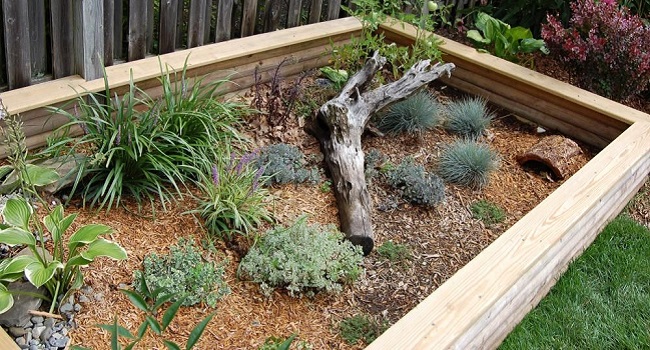
Substrate
You want to use a substrate that will allow the Russian tortoise to dig. Peat moss, Cypress mulch and coconut fiber are ideal substrates for Russian tortoise enclosures. Avoid using pine, cedar or sand.
Humidity
The humidity level for a Russian tortoise should be between 30% – 50%.
Heating and Lighting
When housing a Russian tortoise inside, provide both warm and cool areas for proper thermoregulation. The daytime temperature should be no lower than 70°F on the cool side. The basking temperature should be 90-100°F.
The nighttime temperature should never fall below the mid-50s°F. If your Russian tortoise is outside and the weather dips, have an indoor enclosure ready to bring in the tortoise.
UV
Russian tortoises need UV lighting, as well. UV light helps tortoises make vitamin D, which is essential for calcium absorption. Use a UV tube or UV bulb for about 12-14 hours a day.
Diet
Food
Russian tortoises are grazers. They need a diet with a variety of weeds, leaves and flowers. Feed a Russian tortoise a high-fiber diet with leafy greens and broadleaf weeds and plants.
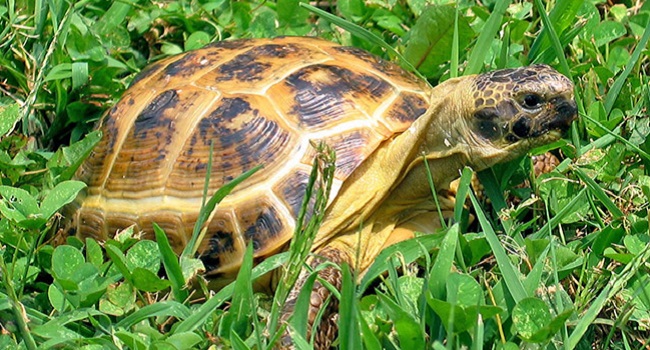
Safe grocery store greens for Russian tortoise.
- Arugula
- Bok choy (sometimes)
- Collard greens (sometimes)
- Endive
- Escarole
- Grape leaf
- Mustard greens (sometimes)
- Oakleaf
- Radicchio
- Spring Mix lettuces
Safe weeds for Russian tortoises
- Cats ear
- Chia
- Chick weed
- Clovers
- Dandelion weeds
- Geranium
- Mallow
- Moringa
- Nettles
- Plantains (Broadleaf and Narrow Leaf)
- Sow thistle
You can also offer commercial tortoise pellets, like Mazuri and Zoo Med Grassland Diet.
Water
Provide a shallow water dish for the tortoise to soak in and drink from.
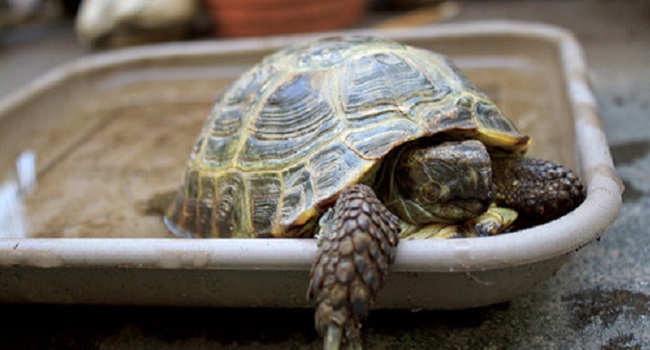
Supplementation
Cuttlebone is a great source of calcium, but not all tortoises will eat it. You can still have it available in the enclosure.
Tortoises that do not have access to an outdoor enclosure, or during the winter when it’s just too cold to go outside, use a calcium + D3 supplement twice a week. For tortoises that spend sufficient time outside, use a calcium supplement without D3.
A multi-vitamin can also be offered once a week.
